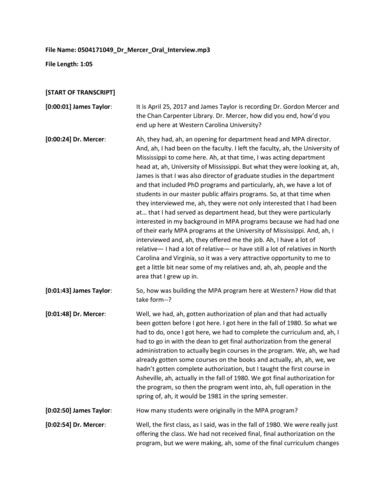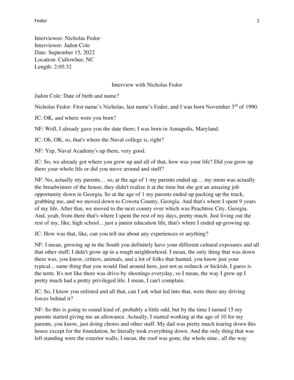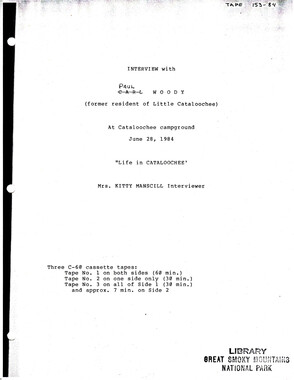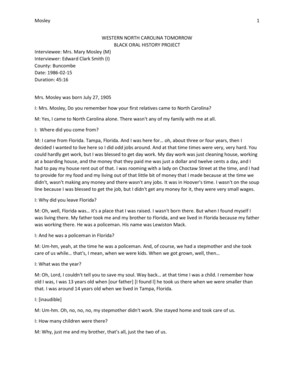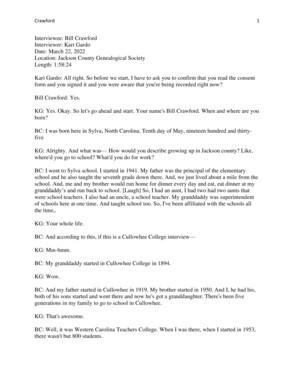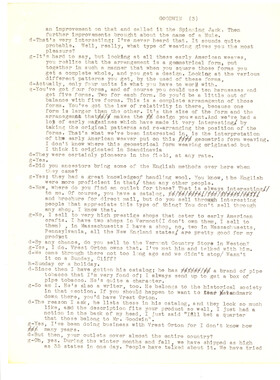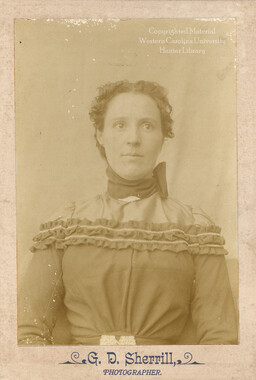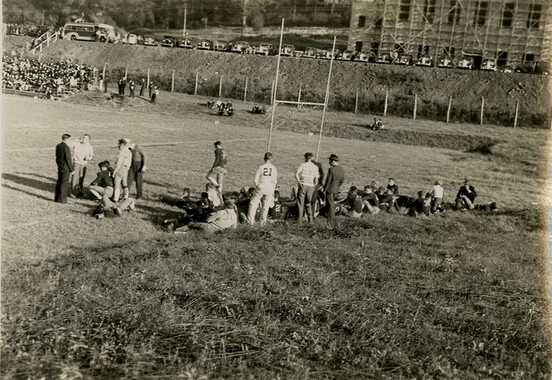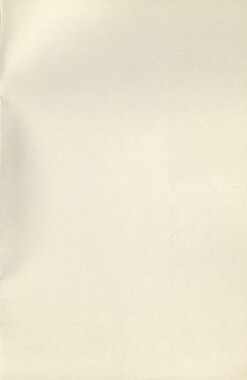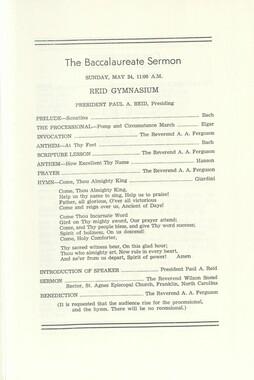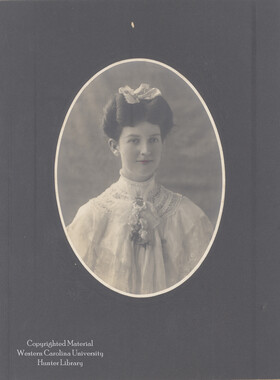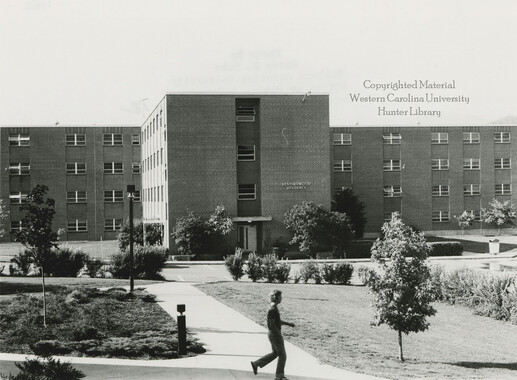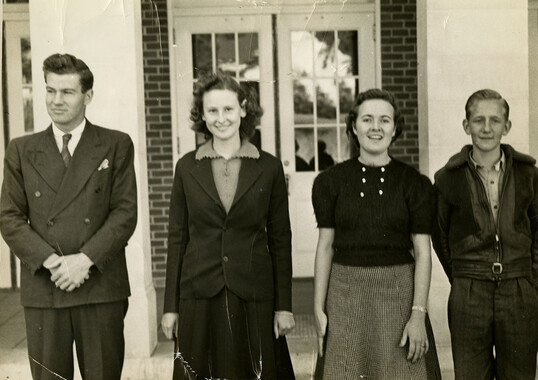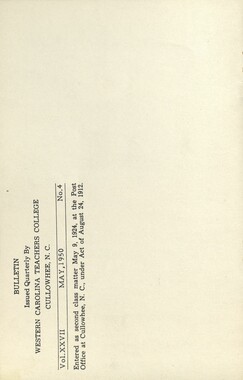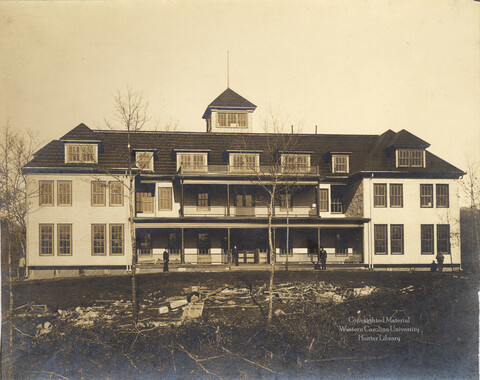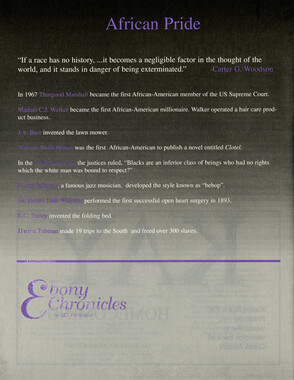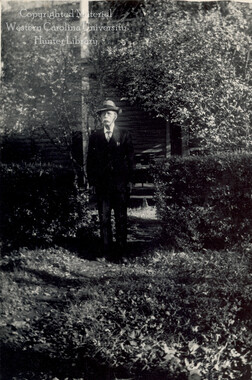Western Carolina University (20)
View all
- Canton Champion Fibre Company (2308)
- Cherokee Traditions (293)
- Civil War in Southern Appalachia (165)
- Craft Revival (1942)
- Great Smoky Mountains - A Park for America (2767)
- Highlights from Western Carolina University (430)
- Horace Kephart (941)
- Journeys Through Jackson (154)
- LGBTQIA+ Archive of Jackson County (24)
- Oral Histories of Western North Carolina (314)
- Picturing Appalachia (6772)
- Stories of Mountain Folk (413)
- Travel Western North Carolina (160)
- Western Carolina University Fine Art Museum Vitreograph Collection (129)
- Western Carolina University Herbarium (92)
- Western Carolina University: Making Memories (708)
- Western Carolina University Publications (2283)
- Western Carolina University Restricted Electronic Theses and Dissertations (146)
- Western North Carolina Regional Maps (71)
- World War II in Southern Appalachia (131)
University of North Carolina Asheville (6)
View all
- Ensley, A. L. (Abraham Lincoln), 1865-1948 (1)
- Western Carolina College (31)
- Western Carolina Teachers College (43)
- Allanstand Cottage Industries (0)
- Appalachian National Park Association (0)
- Bennett, Kelly, 1890-1974 (0)
- Berry, Walter (0)
- Brasstown Carvers (0)
- Cain, Doreyl Ammons (0)
- Carver, George Washington, 1864?-1943 (0)
- Cathey, Joseph, 1803-1874 (0)
- Champion Fibre Company (0)
- Champion Paper and Fibre Company (0)
- Cherokee Indian Fair Association (0)
- Cherokee Language Program (0)
- Crittenden, Lorraine (0)
- Crowe, Amanda (0)
- Edmonston, Thomas Benton, 1842-1907 (0)
- Fromer, Irving Rhodes, 1913-1994 (0)
- George Butz (BFS 1907) (0)
- Goodrich, Frances Louisa (0)
- Grant, George Alexander, 1891-1964 (0)
- Heard, Marian Gladys (0)
- Kephart, Calvin, 1883-1969 (0)
- Kephart, Horace, 1862-1931 (0)
- Kephart, Laura, 1862-1954 (0)
- Laney, Gideon Thomas, 1889-1976 (0)
- Masa, George, 1881-1933 (0)
- McElhinney, William Julian, 1896-1953 (0)
- Niggli, Josephina, 1910-1983 (0)
- North Carolina Park Commission (0)
- Osborne, Kezia Stradley (0)
- Owens, Samuel Robert, 1918-1995 (0)
- Penland Weavers and Potters (0)
- Rhodes, Judy (0)
- Roberts, Vivienne (0)
- Roth, Albert, 1890-1974 (0)
- Schenck, Carl Alwin, 1868-1955 (0)
- Sherrill's Photography Studio (0)
- Smith, Edward Clark (0)
- Southern Highland Handicraft Guild (0)
- Southern Highlanders, Inc. (0)
- Stalcup, Jesse Bryson (0)
- Stearns, I. K. (0)
- Thompson, James Edward, 1880-1976 (0)
- United States. Indian Arts and Crafts Board (0)
- USFS (0)
- Vance, Zebulon Baird, 1830-1894 (0)
- Weaver, Zebulon, 1872-1948 (0)
- Western Carolina University (0)
- Western Carolina University. Mountain Heritage Center (0)
- Whitman, Walt, 1819-1892 (0)
- Wilburn, Hiram Coleman, 1880-1967 (0)
- Williams, Isadora (0)
- 1880s (4)
- 1890s (34)
- 1900s (103)
- 1910s (29)
- 1920s (63)
- 1930s (132)
- 1940s (90)
- 1950s (63)
- 1960s (68)
- 1970s (40)
- 1980s (54)
- 1990s (18)
- 2000s (10)
- 2010s (3)
- 1600s (0)
- 1700s (0)
- 1800s (0)
- 1810s (0)
- 1820s (0)
- 1830s (0)
- 1840s (0)
- 1850s (0)
- 1860s (0)
- 1870s (0)
- 2020s (0)
- Appalachian Region, Southern (1)
- Jackson County (N.C.) (683)
- Macon County (N.C.) (3)
- Qualla Boundary (2)
- Asheville (N.C.) (0)
- Avery County (N.C.) (0)
- Blount County (Tenn.) (0)
- Buncombe County (N.C.) (0)
- Cherokee County (N.C.) (0)
- Clay County (N.C.) (0)
- Graham County (N.C.) (0)
- Great Smoky Mountains National Park (N.C. and Tenn.) (0)
- Haywood County (N.C.) (0)
- Henderson County (N.C.) (0)
- Knox County (Tenn.) (0)
- Knoxville (Tenn.) (0)
- Lake Santeetlah (N.C.) (0)
- Madison County (N.C.) (0)
- McDowell County (N.C.) (0)
- Mitchell County (N.C.) (0)
- Polk County (N.C.) (0)
- Rutherford County (N.C.) (0)
- Swain County (N.C.) (0)
- Transylvania County (N.C.) (0)
- Watauga County (N.C.) (0)
- Waynesville (N.C.) (0)
- Yancey County (N.C.) (0)
- Aerial Views (44)
- Artifacts (object Genre) (2)
- Biography (general Genre) (1)
- Clippings (information Artifacts) (4)
- Drawings (visual Works) (1)
- Fliers (printed Matter) (1)
- Glass Plate Negatives (1)
- Interviews (5)
- Letters (correspondence) (7)
- Manuscripts (documents) (4)
- Photographs (516)
- Plans (maps) (1)
- Poetry (3)
- Postcards (6)
- Programs (documents) (121)
- Publications (documents) (12)
- Scrapbooks (5)
- Slides (photographs) (22)
- Sound Recordings (4)
- Speeches (documents) (1)
- Transcripts (3)
- Aerial Photographs (0)
- Albums (books) (0)
- Articles (0)
- Cards (information Artifacts) (0)
- Crafts (art Genres) (0)
- Depictions (visual Works) (0)
- Design Drawings (0)
- Envelopes (0)
- Facsimiles (reproductions) (0)
- Fiction (general Genre) (0)
- Financial Records (0)
- Guidebooks (0)
- Internegatives (0)
- Land Surveys (0)
- Maps (documents) (0)
- Memorandums (0)
- Minutes (administrative Records) (0)
- Negatives (photographs) (0)
- Newsletters (0)
- Newspapers (0)
- Occupation Currency (0)
- Paintings (visual Works) (0)
- Pen And Ink Drawings (0)
- Periodicals (0)
- Personal Narratives (0)
- Portraits (0)
- Questionnaires (0)
- Sheet Music (0)
- Specimens (0)
- Text Messages (0)
- Tintypes (photographs) (0)
- Video Recordings (physical Artifacts) (0)
- Vitreographs (0)
- A.L. Ensley Collection (1)
- Appalachian Industrial School Records (0)
- Appalachian National Park Association Records (0)
- Axley-Meroney Collection (0)
- Bayard Wootten Photograph Collection (0)
- Bethel Rural Community Organization Collection (0)
- Blumer Collection (0)
- C.W. Slagle Collection (0)
- Canton Area Historical Museum (0)
- Carlos C. Campbell Collection (0)
- Cataloochee History Project (0)
- Cherokee Studies Collection (0)
- Daisy Dame Photograph Album (0)
- Daniel Boone VI Collection (0)
- Doris Ulmann Photograph Collection (0)
- Elizabeth H. Lasley Collection (0)
- Elizabeth Woolworth Szold Fleharty Collection (0)
- Frank Fry Collection (0)
- George Masa Collection (0)
- Gideon Laney Collection (0)
- Hazel Scarborough Collection (0)
- Hiram C. Wilburn Papers (0)
- Historic Photographs Collection (0)
- Horace Kephart Collection (0)
- Humbard Collection (0)
- Hunter and Weaver Families Collection (0)
- I. D. Blumenthal Collection (0)
- Isadora Williams Collection (0)
- Jesse Bryson Stalcup Collection (0)
- Jim Thompson Collection (0)
- John B. Battle Collection (0)
- John C. Campbell Folk School Records (0)
- John Parris Collection (0)
- Judaculla Rock project (0)
- Kelly Bennett Collection (0)
- Love Family Papers (0)
- Major Wiley Parris Civil War Letters (0)
- Map Collection (0)
- McFee-Misemer Civil War Letters (0)
- Mountain Heritage Center Collection (0)
- Norburn - Robertson - Thomson Families Collection (0)
- Pauline Hood Collection (0)
- Pre-Guild Collection (0)
- Qualla Arts and Crafts Mutual Collection (0)
- R.A. Romanes Collection (0)
- Rosser H. Taylor Collection (0)
- Samuel Robert Owens Collection (0)
- Sara Madison Collection (0)
- Sherrill Studio Photo Collection (0)
- Smoky Mountains Hiking Club Collection (0)
- Stories of Mountain Folk - Radio Programs (0)
- The Reporter, Western Carolina University (0)
- Venoy and Elizabeth Reed Collection (0)
- WCU Gender and Sexuality Oral History Project (0)
- WCU Mountain Heritage Center Oral Histories (0)
- WCU Oral History Collection - Mountain People, Mountain Lives (0)
- WCU Students Newspapers Collection (0)
- Western North Carolina Tomorrow Black Oral History Project (0)
- William Williams Stringfield Collection (0)
- Zebulon Weaver Collection (0)
- African Americans (3)
- Church buildings (10)
- College student newspapers and periodicals (8)
- Floods (1)
- Great Smoky Mountains National Park (N.C. and Tenn.) (1)
- Appalachian Trail (0)
- Artisans (0)
- Cherokee art (0)
- Cherokee artists -- North Carolina (0)
- Cherokee language (0)
- Cherokee pottery (0)
- Cherokee women (0)
- Civilian Conservation Corps (U.S.) (0)
- Dams (0)
- Dance (0)
- Education (0)
- Folk music (0)
- Forced removal, 1813-1903 (0)
- Forest conservation (0)
- Forests and forestry (0)
- Gender nonconformity (0)
- Hunting (0)
- Landscape photography (0)
- Logging (0)
- Maps (0)
- Mines and mineral resources (0)
- North Carolina -- Maps (0)
- Paper industry (0)
- Postcards (0)
- Pottery (0)
- Railroad trains (0)
- Rural electrification -- North Carolina, Western (0)
- School integration -- Southern States (0)
- Segregation -- North Carolina, Western (0)
- Slavery (0)
- Sports (0)
- Storytelling (0)
- Waterfalls -- Great Smoky Mountains (N.C. and Tenn.) (0)
- Weaving -- Appalachian Region, Southern (0)
- Wood-carving -- Appalachian Region, Southern (0)
- World War, 1939-1945 (0)
- Sound (4)
- StillImage (553)
- Text (153)
- MovingImage (0)
Interview with Gordon Mercer
Item
Item’s are ‘child’ level descriptions to ‘parent’ objects, (e.g. one page of a whole book).
-
-
File Name: 0504171049_Dr_Mercer_Oral_Interview.mp3 File Length: 1:05 [START OF TRANSCRIPT] [0:00:01] James Taylor: It is April 25, 2017 and James Taylor is recording Dr. Gordon Mercer and the Chan Carpenter Library. Dr. Mercer, how did you end, how’d you end up here at Western Carolina University? [0:00:24] Dr. Mercer: Ah, they had, ah, an opening for department head and MPA director. And, ah, I had been on the faculty. I left the faculty, ah, the University of Mississippi to come here. Ah, at that time, I was acting department head at, ah, University of Mississippi. But what they were looking at, ah, James is that I was also director of graduate studies in the department and that included PhD programs and particularly, ah, we have a lot of students in our master public affairs programs. So, at that time when they interviewed me, ah, they were not only interested that I had been at… that I had served as department head, but they were particularly interested in my background in MPA programs because we had had one of their early MPA programs at the University of Mississippi. And, ah, I interviewed and, ah, they offered me the job. Ah, I have a lot of relative— I had a lot of relative— or have still a lot of relatives in North Carolina and Virginia, so it was a very attractive opportunity to me to get a little bit near some of my relatives and, ah, ah, people and the area that I grew up in. [0:01:43] James Taylor: So, how was building the MPA program here at Western? How did that take form--? [0:01:48] Dr. Mercer: Well, we had, ah, gotten authorization of plan and that had actually been gotten before I got here. I got here in the fall of 1980. So what we had to do, once I got here, we had to complete the curriculum and, ah, I had to go in with the dean to get final authorization from the general administration to actually begin courses in the program. We, ah, we had already gotten some courses on the books and actually, ah, ah, we, we hadn’t gotten complete authorization, but I taught the first course in Asheville, ah, actually in the fall of 1980. We got final authorization for the program, so then the program went into, ah, full operation in the spring of, ah, it would be 1981 in the spring semester. [0:02:50] James Taylor: How many students were originally in the MPA program? [0:02:54] Dr. Mercer: Well, the first class, as I said, was in the fall of 1980. We were really just offering the class. We had not received final, final authorization on the program, but we were making, ah, some of the final curriculum changes and the first class I taught in, ah, Asheville was, ah, um, something on, ah, public leadership. And, ah, we had two students in the class. And I remember I would go over on the bus and the some of the other programs would kid me that “You’re coming over here just to teach two students?” And I said, “Well, yes. You have to get started somewhere,” but the program grew very rapidly in the spring. We had, ah, full courses in operation. Ah, probably, ah, ah, in graduate seminar situations about, ah, ah, 16 or so students; 16 to 20 depending on the class. So, ah, things moved pretty rapidly, ah, once we got the program in full gear, got full authorization from the general administration and, ah, we, we of course in the fall of 1980 began to, ah, talk to groups about the program and what it would do. We were actually in one of the very early programs in North Carolina, ah, and, ah, ah, at that time they had programs at NC State, they had programs at University of North Carolina Chapel Hill, ah, and, ah, as far as, ah, ah, some of the universities, we were one of their early programs, ah, getting underway in North Carolina. [0:04:35] And our, our idea was at that time that you needed, if you were going to become let’s say a county or city manager or federal government manager, that you needed professional training and, ah, so I think what we were doing at that time was, ah, very, ah, critical. I might say for whatever reasons that some of the earliest public administrations were offered in the southeastern part of the United States at universities like the University of Mississippi for example became the first… one of the first few universities in the nation to offer an undergraduate degree called a BPA, bachelor of public administration. And the University of Alabama had been one of the early leaders in the whole area of, ah, ah… University of Alabama had been one of their early leaders in the evolvement and development of some of the earliest MPA programs. [0:05:30] James Taylor: That’s very interesting. All right, um, so when you first started working at the political science department here at Western, what was it like? The faculty, where it was housed, the students? What was it like when you first [0:05:45 crosstalk] --? [0:05:45] Dr. Mercer: Well, I would have to say we had a very committed faculty at that time. Andrew Baggs had been acting chair after, ah, ah, Chan Carpenter passed away. Chan Carpenter was a pretty big loss for the department. Ah, Andrew Baggs was, ah, acting head, but he went on a, ah, as it were, a leave of absence for a couple of years to go back on active duty with the navy. And, ah, it turned out that, ah, after the two years he made the decision that he would stay with the navy. But we had a very committed faculty, with a great deal of emphasis on, ah, teaching. Some of the faculty at that time were Sal Nerboso, Charles Stevens, ah, Steven Ely, Bill Latimer, and, and myself and, ah, we were all very committed both to scholarship, and, ah, and teaching. And, ah, we had a pretty big mission because we had to cover the, ah, the… both the MPA program and we had to cover the undergraduate major. And of course, and the MPA program, ah, as your history will show, ah, that was primarily Asheville-based. So the faculty had to travel quite a bit to... in the evening, our classes were, ah, three-hour classes, ah, one day a week in Asheville and, ah, ah… I think our faculty really did a great job in, ah, getting the MPA program off the ground and, ah, we got some very outstanding students. And, ah, ah… one of the things we had were a combination of what we might call, ah, students that were right out of undergraduate school as well as, ah, people that were ah, often mid-career that wanted to come back and get an advance degree so they could advance better in their field. But, ah, we had, ah, an enthusiastic undergraduate, ah, student body and, ah, our, our classes were very well evaluated and active faculty. Ah, I might say that, ah, ah, Charles Stevens was our main stay in the international area, ah, ah, Sal Nerboso who had a PhD from Harvard University taught in political science as well as American government and our MPA program. And, ah, Steven Ely, ah, was very active in the early days of our, ah, MPA program and, ah, ah, then I taught governmental organizations and public affairs administration at the undergraduate level. I taught primarily American Government, the American Presidency and, ah, I also taught some other areas occasionally; political philosophy and areas like that. [0:08:42] James Taylor: How, how has the political science department changed? Can you walk me through some of the 30 years of the change and growth that the department experienced since you started working here? [0:08:55] Dr. Mercer: Well, as, ah, I got here one of the challenges of the department is that, ah, ah, as Chan Carpenter’s health declined and he couldn’t be as active, but he was department head, towards the end of his tenure, we had had a, ah, somewhat decline in enrollment in the department and, ah, so as Andrew Baggs became acting head after the death of Chan Carpenter, we began a period of building up enrollment and we, ah, began to get more in touch with, ah, some of our graduates, alumni, and we did a survey of them. And of course we had pretty meaningful data that our graduates had done very well. And as I arrived here, ah, to become department head, ah, we promoted… we used that as a tool to promote because we could say exactly what our graduates were doing. We knew what fields they had gone into. We had done very well in pre-law, ah, and a lot of our [0:10:04 backlog] students had gone on to study free law. [0:10:09] We’d also done very well in, ah, the percentage of students that had undertaken graduate study. So one of the realities was increasingly we could tell, ah, prospective students exactly what our graduates had done, the fields that they’d excelled in, all the way from federal government to state and local government, to other meaningful occupations. But we, ah, we had been told about the time that Andrew Baggs became, ah, acting department that if we didn’t grow that our major was threatened. [0:10:45] The second way we dealt with, ah, increasing enrollment was of course getting a, a very outstanding MPA program underway, and, ah, we, ah… as, as I just alluded to earlier, our students came into the program rapidly. They found it very meaningful. So, after a period of, ah, a couple of years, ah, after I became department head and again, Andrew Baggs, I will give him a lot of credit for starting the process. Ah, we became one of the more enrolled majors in Arts and Sciences. So, ah, to some extent, ah, we might say that our period of struggle as far as majors was over. We had to begin to try to build the faculty up, which we began to do, and, ah, we recruited faculty, ah, ah, like Don Livingston. He did a very outstanding job in the classroom and we also recruited a faculty member, Dr. Larry Luton. He was very outstanding in the MPA and undergraduate level. And, ah, so the department, ah, began to grow in terms of both the faculty and majors. Ah, as indicated, we became one of the more enrolled let’s say, ah, departments here at the university as far as Arts and Sciences. [0:12:12] James Taylor: Did you recruit or how did the department recruit students, to get more students enrolled in this major and, and in the MPA program? How did y’all go about that? [0:12:24] Dr. Mercer: Ah, we did, ah, several things. We actually did a newspaper on the major in the department, ah, ah, that gave some of the history of the department and things that our majors did. That was rather well received. It was a-a, a publication. Ah, we also, ah, began to speak more at campuses on the campus and get out word on our major. At that time, we did all the prelaw advising and, ah… [0:12:58] James Taylor: That is from that newspaper? [0:13:00] Dr. Mercer: Ah, yes. Ah, and so we were, we were working actively to, ah, get out there and ah, you know, recruit and, ah, ah, as I said, ah, automatically when a prelaw student came in, it didn’t matter what major they were, ah, we would try to advise them. Of course a lot of your prelaw majors were at that time still our political science majors, because there is an affinity for, you know, that mixture. [0:13:35] James Taylor: Okay, so over the span of your career here at Western Carolina University, is there any way that you have seen the way that people have studied politics or just the realm of political science as it changed? Now that could be… I’m sorry-- [0:13:54] Dr. Mercer: Right. Well, of course, ah, your, your issues are going to change a lot. I would have said over the expansion years of the department that, ah, we began to emphasize policy more, ah, public policy not only in, ah, the domestic arena, but, ah, we also began to, ah, emphasize more, ah, international policy. So more of a policy focus, probably the other big change is both in the MPA program and the undergraduate program, we began to focus more on various, ah, policy, analytical tools, statistical methods, things like that. So one of the things by the time either the undergraduate or the MPA, ah, or you graduated from the MPA, ah, you had, ah, certainly the right capabilities of research, by then, statistical methods and, ah, ah, policy analysis. Ah, of course, ah, the importance of MPA programs as a professional degree began to increase because increasingly towns and cities didn’t want amateurs managing their towns and cities, but they wanted someone with a professional degree. So over a span of time, ah, which certainly had benefit to our MPA program and our undergraduate program, ah, cities and towns, federal government, other public agencies began to, ah, emphasize more in their job advertisements that people needed a, ah, needed a MPA degree. So we— during the expansion of the department, ah, we began to see, ah… we began to see, ah, ah, MPA become a quote on quote “required degree” in the field out there. [0:15:50] One other thing I would say about our department that, ah, ah, we were noted for, is that our, our departmental members assume leadership at the university. Ah, Bill Latimer served in the faculty senate on several occasions. Sal Nerboso was a real leader in terms of, ah, he was our Harvard PhD. Ah, he was selected to the faculty assembly and, ah, again on the faculty senate. Ah, the, ah, the faculty here certainly respected his, ah, ability to, ah, provide outstanding faculty leadership. Ah, I might say on my end, I, I probably got elected more to the faculty senate than maybe any other faculty member. And served five terms in the faculty senate and got elected to the University of North Carolina faculty assembly, which is a meeting of all the state universities to represent the, ah, the university. Um, couple of stories I might tell you on the early history of the department. They may be a little bit on the musing side, but it says something about the early history of our department, and maybe a legacy that is passed on, ah, to some extent. Ah, one of the things when in the ‘70s here, particularly the early ‘70s, a lot of the departments didn’t have telephone, and, ah, you, ah… you know, you were fairly dependent on let’s say the dean’s office or other administrative offices. So one of the musing things Chan Carpenter did, ah, one time, he simply came and installed phones in our department. Of course he was department head, but that probably— I think that story is fairly interesting because in any case our department would take initiative. [0:17:52] And, ah, when the faculty were a little unhappy with, ah, that the department hadn’t been painted enough, ah, Andrew Baggs is acting chair, he came in, ah, one weekend and he painted the department. He was a University of North Carolina PhD, so he painted the department Carolina blue. And, ah, I might some… say some of the administrators weren’t too happy. [0:18:17] James Taylor: Yeah. [0:18:19] Dr. Mercer: With that, but again, ah, I think one of the legacies of our department whether the starting the MPA, or, ah, taking the initiative to keep evolving on our curriculum, ah, our very active approach to recruiting students, ah, our very active approach to getting involved in, ah, faculty governance here, ah, and, ah, and, and initiatives on improving even the physical location of the department, the evolvement of the Chan Carpenter library that we are currently interviewing in with some books and things like that for our students; place for our students to study, that, ah, um, on a broad basis, our department was maybe very inclined to take the initiative to try to not only work to improve the university, but also to improve the department. [0:19:14] James Taylor: It sounds like not just you, but everybody in the faculty was just… they had, like you said, initiative. How much would you contribute or attribute to this department from those faculty members? How much would you say that certain people were very important? [0:19:31] Dr. Mercer: Yes, I would say all our faculty were very active and, ah, important and, ah, like I said, some of our faculty took in initiatives in what we might term faculty governance. Ah, it indicated that, ah, Chan Carpenter came in, installed our phones. We were the first department here to get phones. So just across the board in terms of some of the early faculty that we had all the way form, ah, ah Charles Stevens in the international area. And he was very active in working with the United Nations. Steven Ely, ah, certainly took initiative and a number of area… Bill Latimer was possibly one of the more conservative members in the department, but he had worked in the, ah, Nixon administration and, ah, borrowed a lot of experience there. Sal Nerboso had worked with federal government. Ah, in my case I had worked with the National Institute of Education at the upper echelons of policy as well as ah, ah, the, ah, what would… is at that time called the US Office of Education. So we had a very applied department that had had experience in, in real government. And, ah, I think that, ah, ah, Andrew Baggs, as I had mentioned, had had experience as an officer in the Navy. So I think one of the, ah, things about our faculty, ah, and has continued to be true, is that our faculty, ah, have had real experiences that, ah, ah, really brought life to the, ah, courses. Ah, so our, our faculty has always been noted for doing an outstanding job in teaching. Ah, ah, as you go through your interviews, ah, there have been a lot of teaching of [0:21:24 wars]. [0:21:24] Don Livingston was president of the, ah, ah, North Carolina Political Science Association, which indicated the standing of our faculty. Ah, I was also president of the North Carolina Political Science Association, and ah, ah, later became president of Pi Gamma Mu International Honor Society. So it was… you know, one of the unique things about our faculty and this has certainly continued, is that their faculty not only— our faculty not only had an outstanding reputation within the university, but we could say our faculty has also been known external, externally, you know, through their colleagues, their publications, their various offices they’ve held. So one of the ways the departments can be rated is not only their standing within the university, but are they respected around the, the United States through their work in, ah, academic associations, and publications, ah, getting out there. So I would say that on all those fronts that not only within the university, but external to the university that our faculty over, ah, many decades have really been, ah, respected. [0:22:50] James Taylor: You mentioned that you represented Western Carolina at the North Carolina Senate or whatever that was. [0:22:57] Dr. Mercer: Yes, I, I served, ah, five terms in the, ah, faculty senate. The universities have what you call faculty governance, so any changes in the curriculum or any new proposals for degrees; have to be authorized in the senate of the university. So universities are not exactly like maybe some people may perceive, it top down, but the faculty are very involved in the governance of the university. And, ah, the other way that faculty get involved in the governance is through the university of North Carolina System Faculty Assembly, which advises the overall president of the entire system. And so, as I said, Sal Nerboso, ah, a Harvard PhD was very important as the faculty assembly got underway. And, ah, I served three years in that. But again, ah, through your representation in the faculty assembly, ah, people learn more about your university and you’re able to, ah, do certain things. Ah, for example, I was able to get pass while in the faculty assembly, the first administrative review. And up until that time we had faculty review, but administrators weren’t being reviewed. So I got that through the system. And that meant from that point on that presidents of universities, ah, ah, deans and others would be evaluated, um, and Sal Nerboso again initiated, ah, ah, various ways that faculty could have more influence, ah, ah, within the, ah, within the system. So again, not only is, ah… and, and I think we have been affected at both levels. [0:24:48] In terms of the… what we might call the reputation and academic standing of a department. It’s a combination of not only work within the university, but also external work related to external to department or again in getting involved in some of the, ah, different associations, professional associations that, ah, are out there. And I, I might say that, ah, we have found, ah, we, we, we do maintain real data on what our graduates do, and ah, that creates a sort of a, ah, ah, an understanding of what some of the possibilities are, what are some of the careers and things like that that students will enter once they graduate? [0:25:37] James Taylor: Could you give me a quick example of that? [0:25:39] Dr. Mercer: Okay. Well, um, we found over the years that, ah, ah, again, ah, ah, ah… this is approximation, but I think it’s about 60 percent of our graduates go to graduate school. Now that could be law school. They could be getting an MPA degree that could work a couple years and go back. But that’s fairly odd, ah, as far as universities go. We… among universities, ah, we know that a very high percentage of our MPA graduates, ah, eventually if they don’t actually start there, become city and town managers, because of their degrees. We’ve had a number of students that have gone to work for federal government. Ah, we’ve had a lot of our graduates to be highly successful in business areas. Ah, and, ah, ah, other, other professional areas. [0:26:36] James Taylor: Can you… you mentioned how the faculty can make a… affect a university system in a way like from bottom up instead of top down. So can you tell, and, and while you were here and some of the ways that you affected some of the policies in terms of the students directly, instead of just administrative review or something like that? Can— is there anything that you did or anybody in the department did to affect students of the campus? [0:27:03] Dr. Mercer: Well, one of the things I’ve… I became very much involved in that I think really had an impact on students was working, ah, with Chancellor Bardo. We were the first university of the state to require that every student come in with a computer. And so we were one of the first universities to, ah, develop, ah, students that graduated that really had a lot of electronic capabilities. We did that in the 19… ah, ah, ‘90s once Chancellor Bardo got here. And ah, ah, that was an area that had, had a lot of, ah, ah, impact. Ah, of course our faculty had been involved very much so in the senate and, ah, things like that. And what we’re usually evaluating is courses and curriculums and what impact they will have on students. So, I, I think that critical review, ah… another example that is outside of the department, our department became very involved in trying to get some type of degree in international trade or international business and we initiated that and, ah, and, ah, because of that, the university now has, ah, ah, now has, ah, an international business degree. And the international business degree has requirements not only in business, but arts and sciences. Um, so those, those were a couple of, of examples of, of, ah, ah, things that we… you know, that I think our faculty has had an impact on here at the, ah, the, ah, university. [0:28:56] James Taylor: Can you, um, tell me about some of the courses that you proposed and created as part of the department and how— and can you tell me how some of those courses changed over time and why? [0:29:11] Dr. Mercer: Well, ah, are you talking about the department as a whole or are you talking about, you know, how are you-- ? [0:29:18] James Taylor: Yeah. I would focus this more on I’d say the undergraduate level. [0:29:23] Dr. Mercer: Okay. Okay. Well, one class we initiated in the early ‘80s that I think has definitely had an impact is, ah, a course called Political & Organizational Leadership, and, ah, that’s a course that I think students have benefited a lot from. Um, of course across the board, ah, one of the thing, one of the things we initiated here that was an important initiative is that we, ah, we enabled certain specializations within the major. And, ah, some of those areas were public administration, international relations and American government; so that enabled students to select an area that, ah, ah, they could you know, really wanted to get more depth in. So, it, it probably helped them in getting jobs and that they could say not only did they have a degree in a major, but, ah, they had a minor. But also, they had a specialization in an age that frequently employers are, are looking for, ah, ah, on the job experience. I might say another area that I think that, ah, that we’ve excelled in as a department is opportunities for students to have internships and applied experience. We’ve always had that element in the MPA program. If you haven’t had public experience, and we’ve always worked to help our students get various internship opportunities, which I think is very helpful to, ah, getting jobs. [0:31:02] James Taylor: Getting away from more of the history aspect of, of the department, this is more of a personal question I would say. Um, were there any influential people that you met over the course of your time here teaching at Western that really had an influence on your life, such as Salvatore Nerboso, or Chancellor Bardo or any other example? [0:31:29] Dr. Mercer: Well, just a lot of people I would have to say have had a big influence on me. Ah, one of those is Dr. Don Livingston. He, ah, was at the University of Mississippi. He was one of our graduate students working on the PhD and he taught some of the undergraduate classes there as, ah, as a, ah, PhD student and did well. Ah, he left the University of Mississippi and he went east to Oklahoma State. I, I think a little bit like myself; he was very interested in, ah, getting near to South Carolina, his home state. So we had a job here and he applied, ah, and, and he got it. But we’ve always conferred with each other on issues, and, ah, you know, sought each other’s advice in different areas. So I would have to say he has, ah, sort of been, ah, you know, someone that I confer with, someone who, who’s advice I respect. Ah, Dr. Bardo, since I was so active, Dr. John Barto and the Chancellor since, ah, ah… once he became chancellor, he and I worked very closely together since I was active in faculty government and he frequently sought my advice, I sought his advice, and, ah, ah, we worked together on the computer requirement here at the university, getting that through the faculty senate. Um, particularly on faculty governance issues, we conferred quite a bit. And he was very helpful to us in getting, ah, faculty positions, which we needed to eventually get national accreditation for the MPA program. [0:33:20] Another person that’s been very influential on me is Dr. Rick Collins. Ah, he is, ah, Associate Vice Chancellor. Ah, he had a lot to… he and Dr. Abdul [0:33:33 Torey] had a lot to do with me forming the, the WC Public Policy Institute here. The Public Policy Institute, ah, which I played a key role in forming and directed for a number of years really got our department more into public policy and what we would call summits that brought in a lot of people from all over the state. Um, one of the things John Bardo told me is that a lot of his board members would first become aware of WCU and we would get them to be— come on our board, because of policy summits. So we did a lot of policy summits in areas like, ah, school safety. We were one of the first universities to, to see that threat coming. Ah, ah, in 2000 we were one of the first universities to have a summit on the threat of global terrorists. This is really before terrorism was a major threat. We had key speakers from the FBI and other areas come in, Governor Jim Hunt and, ah, introduced the summit and it all over the region. So, ah, that probably, the evolvement of the, ah, ah, Public Policy Institute, through working with, ah, Dr. ah, [0:34:56 Torey], dean of the graduate school and, ah, as well as Dr. Bardo and Rick Collins, ah, I would say had a big impact all across our university and that’s one of the reasons that I mentioned through our faculty, in our summits, and of course the PPIs still going. Ah, you did ask about the impact of, ah… we had external to the university. [0:35:23] We also organized a, ah, ah, and our Public Policy Institute staff would set it up every year, an American youth congress. And young people would come in and they would pass legislation from high schools all around the region and, ah, a lot of that legislation would then be introduced at the local or state level once people saw some of the ideas of young people. And so I would have to say that one of the things we were trying to do is to build, build an attitude of civic engagement among young people. And so I would have to say that had a great impact, ah, on the region. But, ah, certainly, ah, across the board on our faculty, ah, I’ve always enjoyed working with Chris Cooper, our current department head. Um, and, ah, ah, certainly, ah, over the years, Bill Latimer who, ah, you know, was ah, ah, was a faculty, ah, and, ah… The other person that probably had a lot of impact, ah, on me, was ah, Dean Rosemary DePaolo. She was one of our earlier deans here at the university. And ah, one of the things that she encouraged me to organize, which had a big impact on our university, ah, it was called the faculty assembly. [0:37:00] And the entire faculty at the university would meet periodically, once every three months, and we would make certain recommendations to the university. And we would, ah, we would hold those over at the Ramsey Center and, ah, that was done for a period of maybe four years. But you know, some of those policy recommendations and recommendations of faculty in certain areas, ah, they would, ah… you know, they were having a pretty big impact about the university moving ahead. Ah, one of the things we could say about Western Carolina University, and I think, ah, you know, that faculty had played a major role in that is that we are right behind the University of North Carolina in being the most selective university in North Carolina. Ah, some work was done at the [0:37:56 Greensborough] record and they found that a lot of students wanted to come here, they were wondering why and, ah, they found out that we are the most selective, ah, right behind Chapel Hill in terms of our admission policies. And that, ah, you know, students are pretty enthused here and doing well. But, ah, again, I would just emphasize in terms of the broad trends at the university, the computer requirements, the, ah, international business degree-- [0:38:27] James Taylor: What year was that, computer? [0:38:31] Dr. Mercer: It was in the ‘90s. I would have to really look up the exact year of that, but we were, we were the first state university in the state of North Carolina to actually require that students bring in a computer and we would give them courses. So I think that’s one of the things that probably has had an impact here and that— generally by the time our students graduate, ah, as you know, the digital age was really beginning to impact things. Their advanced knowledge in that area really helped them and we were one of the, ah, the, ah, leaders in that area. So I, I would have to say that, ah, and Chris Cooper, of course, has served, ah, several terms in the faculty senate, ah, ah, and, ah… You know, I would say that, ah, ah, both, ah, within the university and externally, that, ah, our department has been able to exercise; you know quite, quite an influence, ah. As international president of Pi Gamma Mu, we were working with, ah, ah, universities right across the United States and through our international social science review, we were giving faculties, ah, a chance to publish and, ah, ah, you know, also enabling students to become members. [0:40:00] I might say, and this s probably a part of our forgotten history in the department that through Pi Gamma Mu International Honor Society that we really began the Undergraduate Research Conference here. And that gave our students not only in political science, but all across the university a chance to present their research. And we eventually became leaders in the, ah, ah, in the national research conferences, an area that we excel. But as far as the early beginning of undergraduate research conference, ah, we, ah, ah, our department had a big impact on that. We did that with the, ah, Pi Gamma Mu International Honor Society help fund some of the earlier, you know, beginnings of that. And then the Honors College eventually picked that up. I might say, I won’t name the dean, but when, when I first tried to get that underway, one of the deans say, “Oh, that can’t happen at WCU. Our students aren’t that interested in undergraduate research.” And I said, ah… I told the dean, I said, “I would beg to differ.” And you know, we got it off the ground and everybody was, you know, very impressed, you know, with our undergraduate research, the quality of it, getting it off the ground. Our department did that for about, I would say, three years, and then we, you know, got it transferred over to the honors college, to you know, continue that. But I would have to say that, of all the things that our department got underway, that that probably is one thing that maybe has had the greatest impact on our university and our students for that matter, because it gave them the opportunity to, ah, you know, present their undergraduate research. Once they had done it here, they could go on to the national level, the National Undergraduate Research Conferences. [0:42:08] James Taylor: You, um, mentioned a summit was, ah… can you mention some more that the political science department was a part of that were [0:42:15 inaudible] because they’re very interesting? [0:42:18] Dr. Mercer: Some of the summits we had, ah, and again this was a period that I was director of what was called the Public Policy Institute. We began the first summit on terrorism as far as the university really understanding the futuristic, ah, you know, threat of global terrorism. Ah, began that in 2000. [0:42:39] James Taylor: So that was before September 11? [0:42:42] Dr. Mercer: Yes, yes. So we were somewhat predictive, so to speak. That was one of the goals of the PPI, ah, to analyze and predict what some of our future national problems were going to be. To organize summits, get speakers so our region and state were well prepared. Ah, we also did… it was again really before the really big threats began to develop we did a safe, ah, school safety summit. And again, that got a lot of participation, usually somewhere around 500 would come into our summits. And again, we were trying to prepare the nation for, ah… you know, in the policy arena. As I said, our department was becoming involved, but school safety was such a success. A lot of people were beginning to realize the threat and I think we had an impact. We did another summit that a former governor came in and spoke, ah, on small business, on small business development in North Carolina. Ways the state could lead in that area, because we realized that small businesses were a part of the fabric of, ah, ah, you know, job creation. And, ah, that was another summit that we did. We did a summit on, ah, um, tourism. And again, this is an area that Western has always excelled in. [0:44:14] We brought in a number of, ah, speakers and particularly we were emphasizing areas like heritage tourism, building on history and, ah, utilizing history as a means of attracting not only tourists to the area, but eventually people that would, you know, would live in the West. And, ah, we for example, had speakers from Cherokee and a number of the, you know, different tourist areas. Ah, we did another summit on, ah, just plain economic development. And, um, in that, we, we, ah, we focused a lot on… let’s see. We again had a, ah, governor come in and speak, but we had… we always had very prominent speakers at our summit. Speakers included both faculty and very prominent people in the region, but this was a way that we could integrate some of the things that we were doing here at the university with key speakers coming in. So those are a few examples of the summits. As I said, one of things Bardo always said about our summits was that he couldn’t really understand how the Public Policy Institute could, could predict the emerging areas, you know, that the country would have to deal with and we were trying to get our region as well as, ah, you know, ah, others ready to, ah, to, ah, ah, meet the threats. We had one summit on, ah, civic engagement and building democracy. Ah, those, those were few areas that, ah, that, ah, we had summits on. But again, ah, ah, one of the things people would always say, well, how does the PPI know what are some of the emerging issues going to be. Because certainly people were very surprised when they could look back and say, hey, you know, we didn’t terrorism was going to be that big a threat. [0:46:18] We didn’t realize school safety, ah, of course, economic development. You know, more and more states have begun to emphasize that area. A lot of our undergraduate students, as well as graduate students would come our summits, you know, and that meant that they could be more prepared, you know, for the emerging issues in the future. [0:46:46] James Taylor: So I would say that the, the curiosity and the drive of the staff is what lead to these great things like the summits and, and public policy, that was… that is in direct cause of, I mean, faculty like yourself and others that really love political science and what they did. Would you not say so? [0:47:09] Dr. Mercer: I would say that would be, ah, very much true, that, ah, um, increasingly, as I indicated at the beginning of the interview, our faculty were becoming, ah, much more policy-focused. Ah, policy is really the area that, ah, brings government into people’s lives. And you want effective policies in economic development. You want effective policies in, ah, school safety. Ah, the other major summit we had that had quite an impact, um, was that meth was beginning… methamphetamine was emerging as a major regional issue. Ah, and so we had a summit on, ah, preventing the threat of, ah methamphetamine. Ah, and, ah, other threatening drugs. And, ah, that drew a lot of, ah, ah, interest across the region and, ah, you know, probably had a… you know, it’s a lot less of a threat today, but it made our law enforcement more aware. We brought again key speakers in. So I think on a broad basis, and again, ah, ah, ah, you know, our university as well as certain key speakers in that area were involved, but it did get our entire university… because many of our students would attend, and others, but it did get our university more involved in the real issues that impact the society around us. So I think the general— not only in the department of political science, the realization that the university can’t be an Ivory Tower. We can’t be… we have to serve the state. Ah, we, ah, we have to think broader than ourselves and our immediate needs. So we can’t just simply be… one of the roles of the university’s… the state university system is to serve the broader public interest through courses and intellectual opportunities, things like that and, ah, I think this department has always done a very outstanding job of realizing that that means reaching out beyond yourself, getting your students to reach out, that kind of thing. [0:49:41] James Taylor: Were there any major national political issues that directly affected [0:49:45 COWE] the students faculty or the structure of the university while you were here as a teacher? [0:49:57] Dr. Mercer: Ah, I would say terrorism, ah, you know, was something that we, ah, you know, had… Of course 9/11 not only had a big impact on us, but other universities. So it, it certainly impacted, ah, you know, our worries, our… you know, it was an area we covered in courses, things like that. Um, we also had an energy summit here, you know, to how do you, how do you impact let’s say the different energy alternatives looking to the future. So we did cover things at that summit, like solar energy. We covered, ah, you know, agricultural based fuels, wind energy, all the modern components. And I would have to say that that summit probably impacted, ah, you know, some of our conservation measures here at the university. And our courses, as we had to deal with the complex issues of interface of energy policies and energies with, ah, you know conservation and clean energy. Areas like that. Um… but the Reagan year, years were certainly, ah, interesting. That, that was a period of, ah, economic development, and again, whatever the, ah, whatever the issues of the time, they’re, they’re going to impact your courses certainly. Trying to keep students right at the, ah, ah, you know, very much aware, discussing those issues, or teaching about those issues, or writing papers in those areas, things like that; doing research. So those, those are, those are some of the areas. [0:51:55] As I said, the… we began it here in this department, ah, through Pi Gamma Mu International Honor Society that a lot of our students have joined. Ah, the Undergraduate Research Conference and the effectiveness of our students in, in undergraduate research, and, ah, the effectiveness of our students in National Research Conferences, I, I think is, ah, really in a lot of ways it’s really impacted our culture here. As I said, I won’t name the dean, but the dean said, you know, in so many ways, “Gordon, that’s not gonna work, because our students, you know, are not that effective in undergraduate research.” And I told the dean, I said, “I disagree and we’re… you know, we’re going to proceed on this.” I mean, he wasn’t trying to stop or anything like that, or our department, but you know, he, he again, ah, in the final analysis said, “Well, you know, seeing is believing.” [0:52:53 laughs]. [0:53:02] James Taylor: So, in looking forward into the future, how would you like to see this department head or in what ways continue some of the things that we’ve discussed, what would… how do you see the direction as a positive thing? In your eyes, how would the, the direction be? [0:53:19] Dr. Mercer: Well, we have to be very rigorous in our standards and requirements for students, because one of the greatest disservices we could do to students would be to lower our standards, and you know, not require that much in our classes. Because again, our students once they graduate from here, they’re going graduate school, they’re going into various areas, and they have to be prepared. So I think one of the things we need to maintain, because we already have that, is rigorous standards, requirements to take the major seriously. Ah, that kind of thing. So I think effectiveness in teaching and research keeps the faculty up. You know, that continues to be one of our, ah, main missions certainly. Ah, looking to the, ah, future, um… certainly anyway we can enhance the creative abilities of our students. Again, that is frequently done through, ah, you know, research; undergraduate research, graduate research, ah, because what you teach today is going to be very critical, but one of the things in looking in the future of our nation is, we have to adapt with new policies, new ideas, new things. So, I, I think keeping initiative levels among students where they are able to develop new knowledge, ah, they have an academic commitment let’s say, when they leave that they recognize that building the future is a lot up to them and they have to continue their research and studies, things like that. [0:55:21] Um, you know, where, where students, I guess, in a broad way you could say, are fairly independent-minded, you know, they realize that they’ve got to, ah, ah, you know, carry on into new frontiers because one of the things we could say about academia is that what we taught yesterday may be proven incorrect tomorrow. And of course even in an area such as yours, like history, ah, we continually develop new understandings of history. It’s not that we’re changing what actually happened, but we understand things, the importance of things that we didn’t understand before. So in a period like history, not only new developments, but also we’re able to go back and maybe reinterpret the past more effectively. And the same in political science, so, I, I do think, ah, developing creative skills, giving your students opportunities to develop creative skills, ah, giving them the kind of fundamentals that they can be independent in the future, ah, for example, in, in the area of policy analysis as students go out and get jobs that they can effectively evaluate their agency or organization, that kind of thing . [0:56:43] James Taylor: Um, as a point of closure, is there any other interesting stories or just anything that you, that you should add to this history that could, that will make it more interesting, or complete or appropriate? [0:57:11] Dr. Mercer: Well, one, one story I’ll add, which I, ah… and you know, is a part of our history, ah, ah… you know, which I, I still think we need to do from time to time, ah, as you know with our MPA program, we began in Asheville and we taught a lot of our courses on the UNCA campus. One of the things that we initiated was, ah, some of our classes were taught in the City Hall in Asheville and we actually had a, a room that those classes were offered or offered some of those classes. Um, and the other city hall agency we taught classes in was the Asheville Police Department and, ah, we had a seminar room that I taught a few classes. Ah, other classes were offered in Asheville in the city facilities. And we had Jim Westbrook on our faculty. He was a, ah, city manager. I don’t think he’s actually listed because he was adjunct. But, ah, I think there’s something about actually teaching a course right there in the heart of government. That was a pioneering effort and, ah, you know, I, I, I think that… you know, I really do think that, ah, things like that help the department interface more. Again, we’ve had on our faculty not only Jim Westbrook the manager of City of Asheville teaching a class for our students, but also we’ve had the… we had one of the associate, ah, city managers teach a class in our curriculum. But I think— you know and I, I mentioned our policy summits, I’ll… but one story, I’ll say this, ah, I’m, I’m an ex-marine and you know, ah, I spent six years in the Marine Reserves. [0:59:24] James Taylor: Thank you for your service. [0:59:27] Dr. Mercer: And, ah, so one day I was trying to get my students motivated to, ah, to, ah, you know, participate and encourage others to participate in an important summit that we had coming up. And I tell them, ah, “Well, if you did…” Right in the middle of my class was a fire pole, you know, because fire department was right below us, you know, was… I say right in the middle of the class, actually, over to the side. [0:59:58] James Taylor: In the Town Hall of Asheville? [1:00:00] Dr. Mercer: Ah, yeah, yeah, yeah. We were right above the, ah, you know, the actual fire trucks and everything and periodically you could hear them. Like I said, it was a real sound of government. And I kidded my students that, ah, you know, I would— if they would, ah, do something, that I would slide down the fire pole [1:00:17 chuckles]. [1:00:18] James Taylor: Yeah. [1:00:20] Dr. Mercer: I’ll admit I was a little bit worried about that, because it had been years since I’d served in the marines and, ah… so I didn’t know exactly that would go. Ah, they, ah, ah, they did you know, a lot of them did really get involved in whichever summit that was, but they never caught my hand and made me slide down the fire pole [1:00:42 chuckles]. Like I said, I had mixed feelings about that, you know, being, ah, on up, ah… you know, in years I was no longer of course in the Marine Reserves and things like that. But, you know, I, I think that, ah, you know, um, I do think that this department, ah, has had a, ah, through the PPI, and then one of the things they do a lot now, they advise local governance. And, ah, you know, they would look at some of the things they were doing in policy area. I know for example, they recently had a project in the town of Franklin where they made certain recommendations after, ah, studying the situation. And so, ah, you know, a, a lot of the stories we… you know, I could tell. I also served on a county reorganizational taskforce that revamped a lot of the policies and procedures in ah, ah, Buncombe County. And you know, we could go across the board in our various ways they’d been involved with real government, you know, and that involves exchanges with local officials, different taskforces and things like that. So I, I think that, you know, the heart of what we do is teach and do research, but again that is really enhanced by, ah, you know, real contacts with real government in our case, since we are teaching about government. And so… [1:02:13] James Taylor: [1:02:13 crosstalk]. [1:02:14] Dr. Mercer: But you know, I, I give the fire pole idea, you know, that I, I think periodically it’s really a good idea to offer real classes in, out there in government agencies. That was sort of a pioneering endeavor. But I would say that, ah, it, it really worked well and it brought us a lot closer to our real governance. Ah, you could occasionally hear in that classroom a fire engine starting up and just for a few minutes, you know, you would hear the sirens go off, but it, it did remind the students of here we are, right here in real government agency. And you know, we’re learning to be leaders in this area. So, I, I’d say that, ah, there is something to be said for, you know, ah, departments of government, political science, public affairs, to continue to be engaged or involved in real governance. [1:03:12] James Taylor: I would say that’s one of the most fascinating things about studying political science, is the ability that the department or students have in reaching the region that surround them. [1:03:22] Dr. Mercer: I think you’re right, absolutely. [1:03:24] James Taylor: Um, so is there anything else before we finish up-- [1:03:29] Dr. Mercer: No, I… you know, I just say that, ah, as professor [1:03:33 Meridis], ah, ah, you know, and I think, ah, Dr. Cooper has shared that with you, and you know, other faculty, we really appreciate you doing the history because I, I think frequently, ah, studying history helps you to… you really can’t improve the future until you know the past. And, ah, you know, I think your work will really facilitate, ah, the department looking at some of the trends and things that have happened, ah, ah, you know, and give us better understanding of some of the things we need to do in the future. So appreciate what you’re doing. [1:04:14] James Taylor: Well, thank you for letting me interview you. It’s, ah, very crucial in the history of the department. [1:04:20] Dr. Mercer: Yeah. Very, ah-- [1:04:21] James Taylor: Appreciate your dedication to the department and, and to this. I thank you sir. [1:04:25] Dr. Mercer: Well, thank you James. [1:04:27] James Taylor: So… [END OF TRANSCRIPT]
Object
Object’s are ‘parent’ level descriptions to ‘children’ items, (e.g. a book with pages).
-
James Taylor interviews Dr. Gordon Mercer about the history of the Political Science department at WCU. Dr. Mercer came to WCU in the fall of 1980 to direct the newly formed MPA program. The program went into full operation in the spring of 1981. They go on to discuss class size, faculty, student enrollment, and the way the program has changed in the past 30 years.
-
